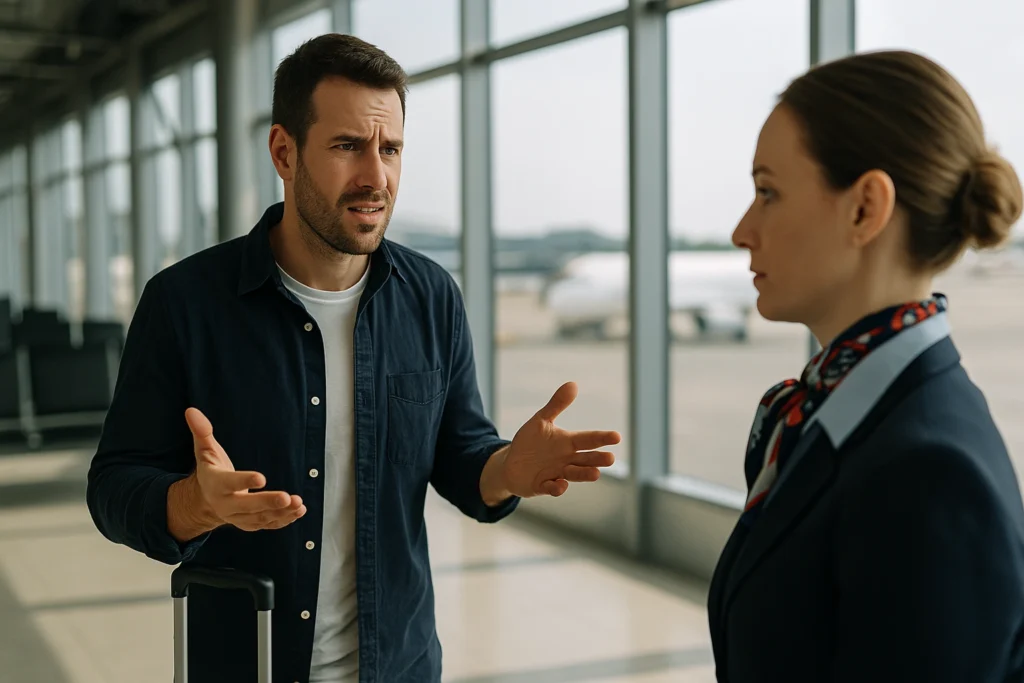
You arrive early, breeze through security, and get to your gate, only to hear the dreaded announcement—your seat is gone. Denied boarding occurs when an airline sells more tickets than available seats. You followed all the rules and had a valid ticket, yet you’re left behind. This isn’t just poor customer service; it comes with legal rights, obligations, and options that many travelers don’t realize they have.
Common Reasons Airlines Deny Boarding
Airlines deny boarding for a few reasons, but not all qualify for compensation.
Voluntary Bumping
When flights are oversold, airline staff ask for volunteers to take a later flight. In return, they offer incentives such as travel vouchers, meals, or hotel stays. If you agree, you waive the right to further claims.
Involuntary Bumping
If no one volunteers, the airline selects passengers to remove. This is involuntary denied boarding. You keep your right to compensation under federal law and possibly under state protections if the issue impacts travel from or within Texas.
Other Denial Reasons
- Missing or improper documentation
- Late arrival at gate
- Security risks or behavior concerns
- Flight changes due to aircraft swaps
Only involuntary denial due to overbooking usually qualifies for financial compensation.
Federal Protections Still Apply in Texas
Texas does not have specific statutes that override federal aviation rules. The U.S. Department of Transportation (DOT) sets the rules for denied boarding. These protections apply to all domestic flights and flights leaving U.S. soil.
Passenger Rights Under Federal Law
If you’re involuntarily denied boarding, the DOT requires airlines to pay compensation based on how delayed you are at your destination.
- 0 to 1 hour delay: No compensation required
- 1 to 2 hour delay (domestic): 200% of one-way fare (up to $775)
- 2+ hour delay (domestic): 400% of one-way fare (up to $1,550)
- International flights: Rules differ slightly, with higher compensation for longer delays
The airline must pay you in cash, not just a voucher, unless you agree to a different form.
Texas-Specific Rights and Considerations
While federal law governs most flight rules, Texas consumer laws still protect you. If an airline acts deceptively, you may file a complaint under the Texas Deceptive Trade Practices Act (DTPA).
When to Consider a DTPA Claim
- The airline promises a confirmed seat but fails to provide it
- You face financial loss due to denied boarding
- Airline staff give false or misleading information
Texas law allows you to sue for actual damages and possibly court costs or legal fees. Courts might award additional penalties if the court finds the airline acted knowingly or intentionally.

Immediate Steps to Take if Denied Boarding
Denied boarding often comes as a surprise. How you respond in the moment can impact what you receive.
Step-by-Step Response
- Stay Calm and Ask Questions
Ask for the reason behind the denial. Confirm if you were bumped voluntarily or involuntarily. - Request Written Documentation
Ask for a statement that confirms you were involuntarily denied boarding. Airlines must provide a written statement of your rights under DOT rules. - Track Delays
Take note of your new flight time. Keep track of how long your delay lasts. - Collect Proof of Expenses
If you spend money on food, lodging, or transport due to the delay, keep receipts. These may support a future claim. - Don’t Sign Away Rights Without Reading
Some airlines offer vouchers but include waiver language. Read everything carefully.
How to File a Complaint
If the airline refuses to pay what you’re owed or offers poor treatment, take action.
DOT Complaint Process
You can file a complaint through the Department of Transportation’s Aviation Consumer Protection portal. Include details such as:
- Your full name and contact info
- Flight details and confirmation number
- A clear description of what happened
- Any documents or emails from the airline
The DOT investigates complaints and may penalize airlines that break rules.
Texas Attorney General’s Office
For unfair treatment under Texas consumer protection laws, submit a report through the Attorney General’s online form. If multiple passengers report abuse, the office may take broader legal action.

What Compensation Can Cover
Denied boarding compensation doesn’t only apply to flight costs. It can extend to other losses tied to the delay.
Examples
- Hotel expenses due to rebooking
- Missed events or work-related loss
- Meal costs
- Alternate transportation fees
- Lost prepaid bookings for hotels or tours
If you paid with a credit card that includes travel protection, you may recover these losses through your card provider too.
Airlines’ Responsibility During Delays
If you’re bumped and rebooked for a later time, the airline must still offer reasonable care. That means food vouchers, hotel rooms, and transport between the airport and hotel.
Each airline sets its own policies, but DOT strongly encourages fair treatment. You have the right to ask for these services if the delay spans hours or overnight.
When Legal Action Makes Sense
Most denied boarding cases settle at the airport. But in some cases, the airline refuses to pay or behaves in bad faith.
You May Consider Legal Action If
- The airline offers compensation below federal limits
- They fail to rebook you on a reasonable flight
- Staff gives false or incomplete information
- You suffer financial harm due to their actions
You can take the case to small claims court or consult a consumer attorney. Keep all written communication, screenshots, and receipts as evidence.
How to Avoid Denied Boarding in the Future
Denied boarding isn’t always avoidable, but you can lower your risk.
Tips to Protect Yourself
- Check in as early as possible
- Choose assigned seats during booking
- Avoid tight layovers that lead to missed flights
- Fly earlier in the day when planes have fewer delays
- Travel light so you can switch flights faster if bumped
Some frequent flyer programs offer protection against bumping, giving elite members priority when overbooking occurs.
Conclusion
Denied boarding under Texas State Law offers two layers of protection: federal regulations and local consumer safeguards. While airlines can overbook flights, they are required to compensate passengers fairly when delays occur. Texas law adds an extra layer of protection if airlines mislead or deceive passengers.
Passengers who know their rights are more likely to receive compensation. Stay calm, ask questions, and keep documentation of everything. Whether you file a complaint or seek legal assistance, your actions can hold airlines accountable for how they treat travelers.

Other Related Articles:
- Faulty Aviation: The Latest Frightening Boeing 737 MAX Incidents
- Unauthorized Access: Nathan Jones Attempts To Get Past Security
- Limiting Monopolies: The Big Merger Between JetBlue And Spirit Airlines
- International travel with children after a Texas Divorce
- The Impact of International travel, Passports and Children on Divorce in Texas
- Texas Divorce and Airline Employee Child Custody Possession Order?
- Understanding Involuntary Denied Boarding
- How To Protect Your Rights and Yourself
- Visitation Rights: Understanding and Protecting Your Parental Rights
- The rights of Lesbian, Gay and Transgender parents in Texas family law cases
Frequently Asked Questions
Denied boarding can occur for various reasons, including overbooking, safety concerns, documentation issues, and more. It’s essential to understand your rights in such situations.
If you are denied boarding, stay calm and approach the airline’s customer service desk for assistance. They will provide you with information about your options, compensation, and alternative flights.
When denied boarding occurs, you may be entitled to compensation, alternative flights, accommodations if needed, and reimbursement for expenses incurred due to the incident.
Denied boarding can be voluntary, where passengers willingly give up their seats for compensation, or involuntary, where passengers are denied boarding against their will due to factors like overbooking or safety concerns.



